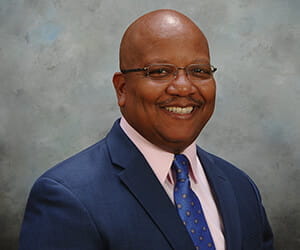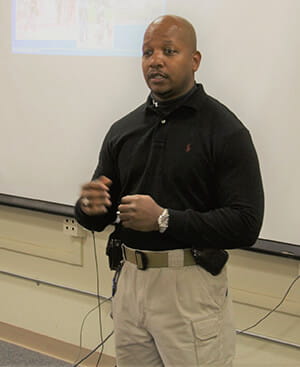Dr. Marvin Whitfield worked in law enforcement in Alabama for 27 years. It was a career where he could be on the front lines and make a difference. As a police officer, he was deeply proud of being able to help members of his community.

This issue came to the forefront shortly after Dr. Whitfield’s retirement from the Alabama police force. Working as a government consultant, a police officer pulled him over outside of his gated and predominately white community in Charlottesville, Virginia. From his years of training, he knew this wasn’t a typical stop, especially since he wasn’t speeding. He was asked to step to the rear of his vehicle as the other officer ran his information.
“What made me feel upset and self-conscious was when my neighbors started slowing down,” says Dr. Whitfield, a Walden University PhD in Criminal Justice graduate. “I was embarrassed because they probably thought I did something wrong. I thought about every young man that I stopped when I was working as a police officer on the crime unit and their reaction to it. I started developing empathy.”
When the officer came back to Dr. Whitfield’s car, he asked if there were weapons in the vehicle. The situation deescalated after Dr. Whitfield provided identification showing he was a reserve police officer in Alabama.
“It wasn’t until I made it home that I processed what happened and realized I was racially profiled,” says Dr. Whitfield. “I don’t think it was racism, but rather implicit bias, which is more of a deadly threat because you’re doing something unconsciously. It’s covert versus overt, so it’s harder to root out.”
A Walden student at the time, Dr. Whitfield decided to focus his dissertation on the “Influence of Implicit Bias Training on the Cultural Competency of Police Officers.” He realized that some of the training he had as a police officer and commander had enforced his biases. For instance, throughout his career, he believed he was most likely to be killed by a young Black male. However, he discovered this was not the case during his literature review. According to the FBI, of the 49 alleged offenders in the slaying of 48 U.S. police officers in 2019, 28 were white and 15 were Black.
“The literature review was the hardest part of my research,” says Dr. Whitfield. “There are a lot of good officers out there trying to do good things. I see it from both sides. I see it as a police officer and as a person of color when we get persecuted for the actions of a few. I found implicit bias training is where we can fix that.”
Dr. Whitfield’s research showed that implicit bias training made law enforcement professionals feel better prepared to manage their biases while interacting with diverse communities. In addition, successfully training police officers during the decision-making process can reduce the potential for stereotyping.
Another issue Dr. Whitfield uncovered was how implicit bias training was provided. Some of the officers he surveyed felt as if they were being attacked or that the information was being force-fed.
“If you go into a conversation with anybody who doesn’t consciously realize how their stereotypes or perspectives impact others, they’re going to go on the defensive,” says Dr. Whitfield. “At that point, the training shuts down. Because of my experiences, I believe everything happens for a reason and implicit bias training became a new path for the rest of my career.”

He was motivated by his research and experiences to launch the Blue Force Mobile Training Team, where he works nationally with police departments, school systems and other organizations to provide professional development and training on workplace safety and cultural competency. He also offers his services pro bono to nonprofits.
“I see the training as more of a discussion,” says Dr. Whitfield. “I teach others on how to manage their implicit bias, that way they won’t have a negative effect on others. The only way you can control and manage it effectively is by having honest and open conversations.”
He starts his sessions by providing some of the data he initially found shocking to get participants to question their existing perspectives. He explains that everyone carries implicit bias, but the trick is to recognize and bring awareness to it so it can be managed when making future decisions. At the end of each session, he challenges participants to have open conversations with someone who differs from them, be it socioeconomically, culturally, racially or by religion.
“Age two-and-a-half is when we start developing our biases,” says Dr. Whitfield. “I’m 51, which means for at least 49 years my perspective on the world has been shaped by my lived and learned experiences. There needs to be constant ongoing education, and we must have those honest conversations.”
Dr. Whitfield hopes he’s creating spaces for those conversations, including within the Big Brother Big Sisters Northwestern Ohio program, where he’s the president and CEO. He launched the Bigs with Badges program to create mentoring relationships between young children and the officers they see in their neighborhoods.
“If we can build those relationships and they can learn from each other, we can achieve understanding, which becomes empathy,” says Dr. Whitfield. “With empathy, you can combat implicit bias. If we can build that bridge and let them see each other from different perspectives, both individuals can become ambassadors. I’m trying to create that dynamic within the community and the area that I serve.”
Dr. Whitfield understands firsthand how education can empower the greater good. He gained valuable insights through his doctoral research that changed his perspectives and helped him to improve his profession.
“My Walden degree impacted how I view the world,” says Dr. Whitfield. “I have learned how to look beyond mere spoken words and to verify streams of diverging information. My levels of cultural competence have expanded and continue to grow positively. I am now driven to share what I have learned with others so I can empower them to look beyond their lenses. The ability to interact cross-culturally creates a path to grow both personally and professionally.”



